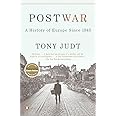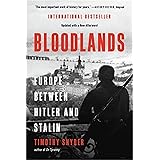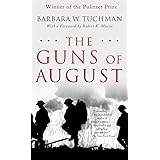Buy new:
-35% $16.33$16.33
Save with Used - Good
$11.49$11.49
Ships from: Amazon Sold by: Zoom Books Company

Download the free Kindle app and start reading Kindle books instantly on your smartphone, tablet, or computer - no Kindle device required.
Read instantly on your browser with Kindle for Web.
Using your mobile phone camera - scan the code below and download the Kindle app.

OK
 Audible sample Sample
Audible sample Sample 


Postwar: A History of Europe Since 1945 Paperback – Illustrated, September 5, 2006
Purchase options and add-ons
“Impressive . . . Mr. Judt writes with enormous authority.” —The Wall Street Journal
“Magisterial . . . It is, without a doubt, the most comprehensive, authoritative, and yes, readable postwar history.” —The Boston Globe
Almost a decade in the making, this much-anticipated grand history of postwar Europe from one of the world's most esteemed historians and intellectuals is a singular achievement. Postwar is the first modern history that covers all of Europe, both east and west, drawing on research in six languages to sweep readers through thirty-four nations and sixty years of political and cultural change-all in one integrated, enthralling narrative. Both intellectually ambitious and compelling to read, thrilling in its scope and delightful in its small details, Postwar is a rare joy.
Judt's book, Ill Fares the Land, republished in 2021 featuring a new preface by bestselling author of Between the World and Me and The Water Dancer, Ta-Nehisi Coates.
- Print length960 pages
- LanguageEnglish
- PublisherPenguin Books
- Publication dateSeptember 5, 2006
- Dimensions1.62 x 6.03 x 9.06 inches
- ISBN-100143037757
- ISBN-13978-0143037750
The Amazon Book Review
Book recommendations, author interviews, editors' picks, and more. Read it now
Frequently bought together

Similar items that may deliver to you quickly
Editorial Reviews
Review
“Remarkable . . . The writing is vivid; the coverage-of little countries as well as of great ones-is virtually superhuman; and above all, the book is smart. Every page contains unexpected data, or a fresh observation, or a familar observation freshly turned.” —Louis Menand, The New Yorker
“Impressive . . . Mr. Judt writes with enormous authority.” —The Wall Street Journal
“Magisterial . . . It is, without a doubt, the most comprehensive, authoritative, and yes, readable postwar history.” —The Boston Globe
“Brave and remakable.” —The Washington Post
“Brilliant . . . A book that has the pace of a thriller and the scope of an encyclopedia . . . A very considerable achievement.” —The New York Review of Books
“Not likely to be surpassed for many years. . . . This is history writing at its best.” —Publishers Weekly (starred review)
About the Author
Product details
- Publisher : Penguin Books; Reprint edition (September 5, 2006)
- Language : English
- Paperback : 960 pages
- ISBN-10 : 0143037757
- ISBN-13 : 978-0143037750
- Item Weight : 2.12 pounds
- Dimensions : 1.62 x 6.03 x 9.06 inches
- Best Sellers Rank: #297,579 in Books (See Top 100 in Books)
- #372 in European Politics Books
- #596 in German History (Books)
- #2,611 in World War II History (Books)
- Customer Reviews:
About the author

Tony Judt was born in London in 1948. He was educated at King's College, Cambridge and the École Normale Supérieure, Paris, and has taught at Cambridge, Oxford, Berkeley and New York University, where he is currently the Erich Maria Remarque Professor of European Studies and Director of the Remarque Institute, which is dedicated to the study of Europe and which he founded in 1995. The author or editor of twelve books, he is a frequent contributor to The New York Review of Books, the Times Literary Supplement, The New Republic, The New York Times and many other journals in Europe and the US. Professor Judt is a Fellow of the American Academy of Arts and Sciences, a Fellow of the Royal Historical Society, and a Permanent Fellow of the Institut für die Wissenschaften vom Menschen (Vienna). He is the author of "Reappraisals: Reflections On The Forgotten Twentieth Century"" and Postwar: A History of Europe since 1945," which was one of the New York Times Book Review's Ten Best Books of 2005, the winner of the Council on Foreign Relations Arthur Ross Book Award, and a finalist for the Pulitzer Prize.
Customer reviews
Customer Reviews, including Product Star Ratings help customers to learn more about the product and decide whether it is the right product for them.
To calculate the overall star rating and percentage breakdown by star, we don’t use a simple average. Instead, our system considers things like how recent a review is and if the reviewer bought the item on Amazon. It also analyzed reviews to verify trustworthiness.
Learn more how customers reviews work on AmazonReviews with images
-
Top reviews
Top reviews from the United States
There was a problem filtering reviews right now. Please try again later.
To say this is a generic and easy read would be a massive disservice to the author, because it's written like an academic text, the stuff you'd expect to find in college textbooks. The sheer volume of information laid out in Postwar are simply amazing, and at times overwhelming and confusing to understand - much more comprehend. This is not something you can simply finish within a week, or even a month. To the faint of heart this is a scary and intimidating book… but this is what gives it so much power and authority, actually.
The truth is, Tony Judt made a compelling case on the need for Europe to reexamine and reevaluate her own past, especially in her complicity in the Holocaust, and in the bloody Yugoslavian civil war of the 1990s. Both her highs - from the economic miracles of the 1950s, to the political dynamics behind the creation of the EU; to her lows - the indifference in the Yugoslavian crisis, her (in this case Western Europe) stalling of the applications of the Eastern European states, were all exposed and laid bare. Even the messy aftermath and the end of the colonial eras (UK, France, Belgium, the Netherland to name a few), and the actual reasons behind the formation of the EU (a mostly French political project to restrain Germany) were discussed in-depth, and in detail. If one were to look for an authoritative reference on postwar European history, this would be my recommendation.
The author even dedicated a few chapters into the European culture, especially of the 1960s-1970s where the generations became more "liberal" in the sense that secularism and feminism began making waves in the various European states. Judt also adeptly discussed the culture surrounding the European sentiments into the Holocaust (the book's Epilogue) - which I found both surprising and noteworthy. Surprising since I did not expect an entire chapter to be discussed on the culture and the implications of the Holocaust (the Shoah), but noteworthy because how he connected it to the issue of Europe's identity, that Europe needs to confront its own past for it to understand and chart her future - as he said it: "...the recovered memory of Europe's dead Jews has become the very definition and guarantee of the continent's restored humanity." (p.804)
More than that, Judt did a good job on explaining various key events in the continent's postwar history, notably the immediate postwar reconstruction, the Nuremberg trials and subsequent de-Nazification, the creation of NATO...the birth of (the future) European Union, the beginnings of the Cold War, even the fall of Communism and the bloody Yugoslavian civil war. Almost every important event in postwar Europe (of course, up until the early 2000s only), was covered in detail (at times even a bit of overload). Even the culture and the arts (from movies up to the music movements) were also discussed.
However, noteworthy and comprehensive as the book was, there were a few shortcomings by the author - of which I do not find him at fault. Some notable absences (or glossed over in minor details) were the bloody Greek civil war (the focus was on the Greek economic reconstruction and subsequent slide to dictatorship), the obscure Cod Wars between Iceland and the UK (of which Iceland somehow won the conflict), the policy of Finlandization (the political balancing act of postwar Finland to maintain her independence), the 1983 NATO Able Archer joint military exercise (that almost brought the world to the brink of nuclear war again since the 1962 Cuban Missile Crisis), the 1994 Budapest Memorandum (in which Belarus, Ukraine, and Kazakhstan [not a European country] relinquished their nuclear weapons in exchange for security guarantees from the West), and the 1999 bombing of the Chinese Embassy in Belgrade (in the height of the Kosovo War)...to name a few. I am sure there are more important events that were not mentioned by the author, these are the only notable ones I can remember. Another (though at the time minor given the year of its publication) noteworthy mistake was the Russification of Ukrainian identity, notably in the maps provided (Kyiv is spelled as Kiev, Kharkiv as Kharkov)… Again I do not blame the author for this, as it was still interchangeable (plus nobody expected that the region would descend into war...until 2014 and 2022 happened). Nevertheless, these should not take away the book's magnificent discussion and presentation of postwar European history. At least the review's fairly balanced - as it also had its own shortcomings.
Overall, this is an astounding and magnificent piece of literature - a must-read and must-own for every history enthusiast out there. Despite being published in 2005, it is highly relevant to read and own in today's context, as it offered multiple invaluable lessons in how to study, understand, and analyze postwar Europe. While so much has happened since then, it's still worth reading. I'd say Ian Kershaw's The Global Age: Europe 1950-2017 (the 9th installment of The Penguin History of Europe series) is the 'lighter' and more updated version of Judt's book (as the content was similar in so many chapters, yet the coverage is until 2017 - which means the 2008 Global Recession, the EU crisis, and Brexit were all mentioned) - though Kershaw's version is as bit of a heavy and comprehensive reading as Judt's (I'd suggest you need to own both books to fully appreciate European history).
I said to myself that the book would take me months to finish and absorb - and it's true. Despite devoting one and a half hours everyday, it still took me 4 months to finish it (as evidenced by the sheer number of self-adhesive notes I placed next to key information and statistics throughout the book). Though it's well worth the time, and the journey. Highly recommend, and I'd like to end this by offering my everlasting gratitude and thanks to my dear officemate who recommended the book to me - without her, I'd never discover and appreciate this literary and historical masterpiece! To her, thank you for opening my horizons and knowledge on this topic - I simply could not find words that could express how much I am grateful for you. I hope this simple message will be more than enough for you!
Again, highly recommend - but be warned: it's not for the faint-of-heart, or for the causal reader. If you're considering buying this - better be prepared to invest your time into it, but well-worth it at the end.
Reviewed in the United States on April 23, 2023
To say this is a generic and easy read would be a massive disservice to the author, because it's written like an academic text, the stuff you'd expect to find in college textbooks. The sheer volume of information laid out in Postwar are simply amazing, and at times overwhelming and confusing to understand - much more comprehend. This is not something you can simply finish within a week, or even a month. To the faint of heart this is a scary and intimidating book… but this is what gives it so much power and authority, actually.
The truth is, Tony Judt made a compelling case on the need for Europe to reexamine and reevaluate her own past, especially in her complicity in the Holocaust, and in the bloody Yugoslavian civil war of the 1990s. Both her highs - from the economic miracles of the 1950s, to the political dynamics behind the creation of the EU; to her lows - the indifference in the Yugoslavian crisis, her (in this case Western Europe) stalling of the applications of the Eastern European states, were all exposed and laid bare. Even the messy aftermath and the end of the colonial eras (UK, France, Belgium, the Netherland to name a few), and the actual reasons behind the formation of the EU (a mostly French political project to restrain Germany) were discussed in-depth, and in detail. If one were to look for an authoritative reference on postwar European history, this would be my recommendation.
The author even dedicated a few chapters into the European culture, especially of the 1960s-1970s where the generations became more "liberal" in the sense that secularism and feminism began making waves in the various European states. Judt also adeptly discussed the culture surrounding the European sentiments into the Holocaust (the book's Epilogue) - which I found both surprising and noteworthy. Surprising since I did not expect an entire chapter to be discussed on the culture and the implications of the Holocaust (the Shoah), but noteworthy because how he connected it to the issue of Europe's identity, that Europe needs to confront its own past for it to understand and chart her future - as he said it: "...the recovered memory of Europe's dead Jews has become the very definition and guarantee of the continent's restored humanity." (p.804)
More than that, Judt did a good job on explaining various key events in the continent's postwar history, notably the immediate postwar reconstruction, the Nuremberg trials and subsequent de-Nazification, the creation of NATO...the birth of (the future) European Union, the beginnings of the Cold War, even the fall of Communism and the bloody Yugoslavian civil war. Almost every important event in postwar Europe (of course, up until the early 2000s only), was covered in detail (at times even a bit of overload). Even the culture and the arts (from movies up to the music movements) were also discussed.
However, noteworthy and comprehensive as the book was, there were a few shortcomings by the author - of which I do not find him at fault. Some notable absences (or glossed over in minor details) were the bloody Greek civil war (the focus was on the Greek economic reconstruction and subsequent slide to dictatorship), the obscure Cod Wars between Iceland and the UK (of which Iceland somehow won the conflict), the policy of Finlandization (the political balancing act of postwar Finland to maintain her independence), the 1983 NATO Able Archer joint military exercise (that almost brought the world to the brink of nuclear war again since the 1962 Cuban Missile Crisis), the 1994 Budapest Memorandum (in which Belarus, Ukraine, and Kazakhstan [not a European country] relinquished their nuclear weapons in exchange for security guarantees from the West), and the 1999 bombing of the Chinese Embassy in Belgrade (in the height of the Kosovo War)...to name a few. I am sure there are more important events that were not mentioned by the author, these are the only notable ones I can remember. Another (though at the time minor given the year of its publication) noteworthy mistake was the Russification of Ukrainian identity, notably in the maps provided (Kyiv is spelled as Kiev, Kharkiv as Kharkov)… Again I do not blame the author for this, as it was still interchangeable (plus nobody expected that the region would descend into war...until 2014 and 2022 happened). Nevertheless, these should not take away the book's magnificent discussion and presentation of postwar European history. At least the review's fairly balanced - as it also had its own shortcomings.
Overall, this is an astounding and magnificent piece of literature - a must-read and must-own for every history enthusiast out there. Despite being published in 2005, it is highly relevant to read and own in today's context, as it offered multiple invaluable lessons in how to study, understand, and analyze postwar Europe. While so much has happened since then, it's still worth reading. I'd say Ian Kershaw's The Global Age: Europe 1950-2017 (the 9th installment of The Penguin History of Europe series) is the 'lighter' and more updated version of Judt's book (as the content was similar in so many chapters, yet the coverage is until 2017 - which means the 2008 Global Recession, the EU crisis, and Brexit were all mentioned) - though Kershaw's version is as bit of a heavy and comprehensive reading as Judt's (I'd suggest you need to own both books to fully appreciate European history).
I said to myself that the book would take me months to finish and absorb - and it's true. Despite devoting one and a half hours everyday, it still took me 4 months to finish it (as evidenced by the sheer number of self-adhesive notes I placed next to key information and statistics throughout the book). Though it's well worth the time, and the journey. Highly recommend, and I'd like to end this by offering my everlasting gratitude and thanks to my dear officemate who recommended the book to me - without her, I'd never discover and appreciate this literary and historical masterpiece! To her, thank you for opening my horizons and knowledge on this topic - I simply could not find words that could express how much I am grateful for you. I hope this simple message will be more than enough for you!
Again, highly recommend - but be warned: it's not for the faint-of-heart, or for the causal reader. If you're considering buying this - better be prepared to invest your time into it, but well-worth it at the end.




Many Americans remember where they were on 9/11. I was nineteen lounging in front of my parents' living room television when I witnessed east and West German youths using chisels and sledge hammers to gouge the iron flesh of the "Wall of Shame," a physical barrier that had separated them for thirty years. It was a monumental occasion but also surprising, considering that my generation had grown up accepting the unending conflict between Democracy and Communism, the "good guys" verses the "evil empire." How was one to explain such a transformative event?
To answer this question, I turned to Professor Judt's Postwar: A History of Europe Since 1945. It was on page 659 that I found an answer to my question: "Washington did not `bring down' Communism--Communism imploded of its own accord." The history that I had received in school had not meshed with what I had just read. Was it not American muscle that had brought the Soviets to their proverbial knees? My questioning of everything I had known about the twentieth century but especially Europe became a standard fixture as I worked my way through this text.
Standing at a prodigious four sections, 24 chapters, an epilogue, and most importantly 831 pages, there are many themes to explore. So many, in fact, that I would need a different writing venue in order to examine them properly. One of the most important themes, however, is the one that I discovered after finding an answer to my question about the fall of Communism: the ease of collective forgetting and the obtuseness of remembering. Europeans, according to Judt, have belatedly endorsed official history following World War II as having been well intentioned and readily available to the public, but ultimately it was more fiction than fact. Through this declaration, Judt does not suggest that his interpretation is the definitive retrospective; in fact, he contends that future scholarship will likely prove some of his details inaccurate.
However, the evidence he provides, combined with an encyclopedic rendering of postwar Europe, along with his pristine historical credentials, is convincing. His attacks are controversial bordering on scathing, but Judt is a fair arbiter when dishing out blame. For example, in chapter three he likely enraged the left when he praised the United States for saving much of impoverished Europe through the Marshall Plan. By the same token, conservatives may flummox to hear that Marshall dollars found their way to communist countries, notably to Tito's Yugoslavia.
In many chapters, Judt also painstakingly shreds any romantic notions of Communism felt by Communists living in the West, especially France. By the time I finished reading how the Soviet politburo used Eastern European Communist parties to infiltrate, intimidate, torture, and murder as a means of effectively colonizing the eastern bloc, I became nauseous; sickness pulsed through my body when I read that west Europeans--especially Germans--readily accepted Stalin's iron walls because they were happily preoccupied chasing wealth.
What we thought we knew about twentieth century political icons also falls under Judt's microscope. For example, there is Judt's analysis of Prime Minister Margaret Thatcher, who, while certainly making Britain's economy more efficient and productive, was responsible for doing "serious harm to the fabric of British public life." Though Socialist, Francois Mitterrand followed Thatcher's lead in privatizing services and turning rapidly towards free market capitalism via the European Union. Even Greece joined the bandwagon when implementing austerity measures to reform its budget woes, only to be undercut by Germany which refused to abide by the E.U. economic charter right afer reunification. What appears did not really appear, and what was never said actually happened were the two thoughts that ruminated throughout my brain.
Finally, in his epilogue, there is the heart wrenching unpacking of Europe's malfeasant treatment of Jews who somehow survived concentration camps, only to face a country whose citizens refused to acknowledge what had happened and who would foster the heroic myth that they had resisted when in fact they were willing accomplices without German provocation. If one reads Timothy Snyder's Bloodlands, this feat of Jewish survival is astounding considering that 90 percent of the Jews killed in the Holocaust were not even sent to a camp: they were simply shot or gassed.
Remembering what is wrong, forgetting what is correct, and refusing to entertain either. This is what Judt's Postwar contributes most not only to an understanding of postwar Europe but to the twentieth century in general. The twentieth century indeed was a time of immeasurable economic prosperity, but it also was a temporary elixir for the brutal and discomforting memories of the past. As Judt suggests, in the last few decades, Europeans have openly accepted their crimes of the past as an admission ticket to the E.U. That may serve many of my generation well, but it can never replace history itself. Just ask the frustrated younger generation searching for gainful employment. If the next generation is to find its way, it must be equipped with an unvarnished past, an idea which is readily promoted in this text.
Top reviews from other countries
The book covers from 1945 to the late 80s, including cold war.
Anybody interested in understanding the dynamics of Europe should read this book.
Um dos livros mais importantes para o entendimento dos movimentos sociais e políticos da Europa do pós guerra.
In the chapters and paragraphs that are explaining Yugoslavia, there was not even an attempt to investigate, explore, analyze and synthesize the data, facts and resource texts, the way it was done for the rest of the East.
For example, it is stated that Yugoslavia's republic of Slovenia with 7% of population was contributing with about 25% of Yugoslavia's exports.
There is no attempt to investigate and explain, how or why was that? The way it is put in the book, it suggests that Slovenians are, taller, prettier, handsomer, smarter, cleverer ( at the end, this may be so... cynically I add), than the rest of Yugoslavs.
There is no attempt even to try to state the fact that Yugoslav economy was also the case of planned economy. The same as in the East bloc. Like in the case of East Germany, which was delegated to make computers for eastern bloc, or Czechoslovakia that was making steel.
Yugoslavia was, if you look it from that perspective, small East Bloc for itself.
It also does not mention anything about favorite East Bloc economy planning tool, Five Year Plan and planed transfer of industries. In case of Yugoslavia,there was a transfer of industrial companies, machines, people, knowledge and everything else associated, before 1948. from Vojvodina (north of Serbia) to Slovenia and Albania. Also It does not say that many Slovenians were exiled by Nazis to Serbia, and that they survived the war because of the help of Serbians.
What I want to say is that, there was no effort by the author to explain that it was not only the enterprise spirit that made Slovenia exporter. It was delegated to them too, by politburo of SKJ. In Yugoslavia, factories, companies, mines, etc. were established per order of The Party, not only by economic wisdom, or common sense.
Also, statements about Serbia are very much as if the author gave this chapter to one of his students to write, and he or she just copied Madeleine Albright (who also survived the war because of the help of Serbians), or William G. Walker opinions and statements.
I have to add that, the introductory statement that Yugoslavia didn't die, but was killed, is really good summary of what was going on over there.
For the rest of the book, I think that is really very well written. As far as I know. Great book by the author... as always...
















